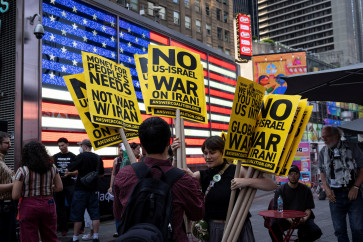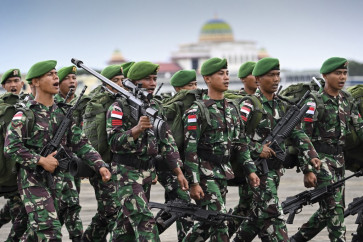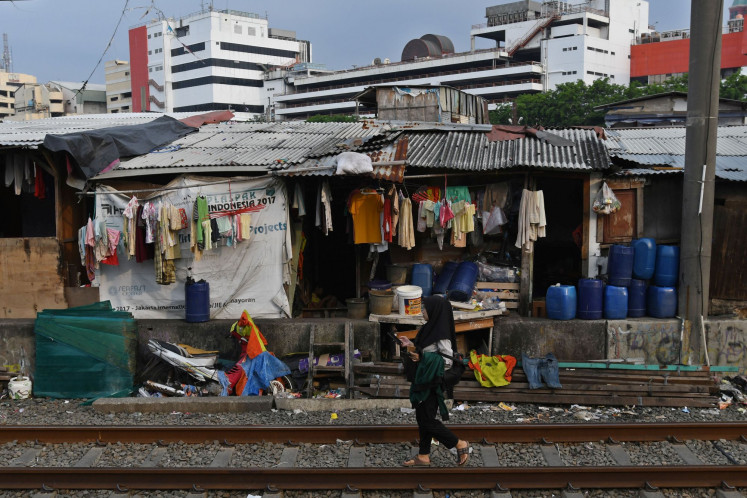Popular Reads
Top Results
Can't find what you're looking for?
View all search resultsPopular Reads
Top Results
Can't find what you're looking for?
View all search resultsDiscourse: Islam Nusantara, a creed of tolerance and diversity
The countryâs largest Muslim organization, Nahdlatul Ulama (NU), is holding its 33rd congress in Jombang, East Java, from Aug
Change text size
Gift Premium Articles
to Anyone

T
he country's largest Muslim organization, Nahdlatul Ulama (NU), is holding its 33rd congress in Jombang, East Java, from Aug. 1 to 5. The organization, established on Jan. 31, 1926, bears the theme 'Islam Nusantara [Islam of the archipelago] for Indonesia and the world'. The following are excerpts of an interview with a prominent researcher on Islam, Martin van Bruinessen from Utrecht University, the Netherlands, in Jombang. He spoke to The Jakarta Post's Ahmad Junaidi.
Question: How do you see the idea and prospect of Islam Nusantara?
Answer: Islam Nusantara is Islam practiced in the context of Indonesian culture. There are many cultural practices that are Islamic, but at the same time, Indonesian. The core teachings of Islam are fixed; teachings about the nature of God, the prophecy and so on are the same here and in Egypt. But many practices differ from country to country. Islam adopts different tones in each place it develops.
There is Arabic Islam, Turkish Islam, Afghanistan, Islam Nusantara. There is also Sufism, especially strong in Indonesia, India and Turkey. Some Sufism practices are Islamicized.
NU, but also Muhammadiyah [the country's second-largest Muslim organization], represent Islam Nusantara.
NU members love visiting cemeteries, as do Egyptians and Turks, but the graves of wali [saints] here are different to those in Egypt, Syria and Turkey.
The graves of the Wali Songo (the nine saints and missionaries of Islam in Java) as a symbol of Islam Nusantara show syncretism. We see Chinese, Indian, Javanese and of course Arabic influences. Sunan Kalijaga [one of the nine saints] used wayang [leather puppet art] to spread Islam.
In Indonesian and Malay, more than 50 percent of the vocabulary is influenced by Arabic, Arab culture, Islam, reflecting a special culture in Nusantara that has an Islamic identity. Many rituals, such as tahlilan [prayer gatherings], are found in other countries, but the forms are different.
The Muhammadiyah rejects rituals like tahlilan, selamatan [prayers for safety], maulid [celebrations of the birthday of Prophet Muhammad], but we see local elements in Muhammadiyah, especially in Yogyakarta, where [the development of Islam] has accommodated Javanese culture.
Indonesia can be proud of its tolerance of diversity ' diversity within the ummah [Muslim community], with Ahmadiyah and Shiites and within the nation, with Christians, Hindus, Buddhism and followers of Confucianism, even of Judaism.
Six temples in Jakarta used to be synagogues, but unfortunately, they were destroyed. Not all groups are tolerant. We have seen horizontal conflicts.
But most people, especially those from the NU, accept difference. This is important. They disagree with Ahmadiyah, Shiites, Christians ' [but say] OK, you have the right to live here. They are relatively tolerant.
Is the promotion of Islam Nusantara a reaction to the increasing influence of Wahabiism, religious-based violence and conflicts in the Middle East?
Yes, of course. Islam Nusantara is different from ['¦] transnational Islam.
For a long time, the government has not carried out its obligation to protect its citizens. No matter what you think of their religion, the Ahmadiyah are citizens and need to be protected. The police have even forged links with some vigilante groups.
That has not changed under the new government. The police should be neutral and not be party to the conflict. Most people demand that each religion be protected as long as it does not disturb peace and order. Police should keep quarrelling factions apart.
NU has a great tradition of protecting minorities in such situations. ['¦]
When Gus Dur [the late Abdurrahman Wahid, the country's fourth president and onetime NU chairman] was president, NU systematically protected threatened churches. The Banser [NU militia] has protected churches [and] the Ahmadiyah community.
There is a growing group of followers of Judaism in North Sulawesi. A group of Jewish Indonesians also discreetly worship in Bekasi, West Java. How do you see the future of Judaism in Indonesia?
Judaism and Zionism have been identified as the enemies of Islam. ['¦] If there was no conflict between Israel and its Arab neighbors, we would not have a discourse of Jews as the enemy, Jews trying to control the world. There is much active export of hatred against Jews from Saudi Arabia, Kuwait and Pakistan. There are many books on hatred against Jews [including] translations of the so-called Protocols of the Eldest of Zion. It's fake ' it was written by a Russian secret agency. The book briefly explains a conspiracy [by Jews] against Islam.
But when people are asked 'Who are Jews in Indonesia?' they see Jews not only as those in the synagogues, but among Catholic, Chinese and minorities who are in control of large parts of economy ['¦] There is a book called Zionist Berwajah Melayu (Zionists with Malay Faces). It's [an issue of] hatred against Jews ['¦], a minority suspected of being rich, powerful, in control of the economy and secretly hostile to Islam. It's a symbol that is easy to be mobilized [into] demonstrations and violence.
Do you think NU can still play an important role in overcoming conflicts and hatred against Ahmadiyah, Jews and other minorities?
Yes, I certainly hope NU tries continuously to play this role. ['¦] Many among NU's younger generation are dedicated to ending corruption in Indonesia and [promoting] responsibility of the natural environment and they are tolerant ['¦]. I am very hopeful about the younger members of NU.









